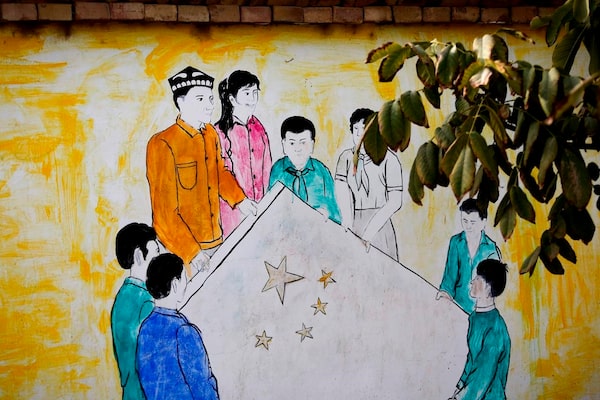
A mural depicting Uighur and Han Chinese men and women carrying the national flag of China decorates the wall of a home at the Unity New Village in Hotan, in western China's Xinjiang region on Sept. 20, 2018.The Associated Press
Chinese authorities have introduced a wide-reaching new regulation that compels parents, schools, religious groups – even restaurants and hotels – to promote “national unity” in the country’s northwestern Xinjiang region, where that term is often used to force predominantly Muslim groups to adhere to Beijing’s definition of proper thought, speech and conduct.
The new regulation, which comes into force March 1, threatens punishment for the publication and dissemination of “speech that harms national unity” and demands that all layers of society participate in promoting it.
Parents, for example, must “educate their children with the concept of national unity and progress,” while children “should influence family members with knowledge of national unity and progress and modern civilized thinking.” At home, families should “cultivate a sense of community of the Chinese nation.”
Schools must teach students “to love the Communist Party of China, love the People’s Republic of China, love socialism with Chinese characteristics and maintain and enhance ethnic unity.”
Religious groups and institutions, meanwhile, must ensure that places of worship incorporate the national flag, the constitution, core socialist values and “the excellent Chinese traditional culture.”
The regulation applies “a gloss of legality – a sugar coating – to what is a blueprint to force unity and, in the process, eradicate the Uyghur culture,” said Margaret Lewis, an associate professor at the Seton Hall University School of Law whose research focuses on law in China and Taiwan.
Part of the regulation provides a new basis for actions already undertaken in Xinjiang in recent years. Authorities have detained large numbers of people for forcible indoctrination and skills training and have built industrial complexes near detention centres, prompting accusations of forced labour.
The rule calls for the “deep fusion of people of all ethnic groups,” including the use of home visits and pairing programs to promote national unity. In recent years, more than a million government workers and Communist Party cadres have been deployed in “Pair Up and Become Family” programs to regularly visit the homes of Uyghurs and other ethnic minorities, in some cases even sharing a bed with them. Beijing has called it a tool to build inter-ethnic friendship and support. Critics have called it a mass state-sponsored home surveillance program.
But in demanding that parents and children promote a government agenda in their interactions with each other, the regulation brings state demands for conformity into the most intimate of relationships.
It is not a law and can therefore be understood “as a code of ethics,” said Mo Shaoping, a prominent Chinese human-rights lawyer.
But, Mr. Mo added, “I haven’t heard of any kind of law that interferes with the way children are educated at home.”
Across China, authorities have stiffened demands for adherence to the ideological course set by President Xi Jinping.
Late last year, the Communist Party released its “Implementation Outline for the Establishment of a Rule of Law-Based Society,” which calls for guiding “the population at large to be loyal admirers, conscientious followers and resolute defenders of the socialist rule of law,” according to an English version posted by China Law Translate.
In China, “the party-state has always permeated into people’s lives. But the level of penetration has reached a new level of saturation,” Prof. Lewis said.
The Xinjiang regulation was passed by the local People’s Congress on Feb. 5. Tibet passed a similar regulation in January 2020 to promote the creation of model national unity and development zones.
The Xinjiang regulation “has great significance for the complete and accurate implementation of the new era of the party’s strategy for governing Xinjiang,” a People’s Congress delegate told state media, adding that it would “strengthen national unity and consolidate social stability and long-term stability of the masses.”
Enwer Erdem, a Uyghur writer living in Europe, called it a policy for “cultural genocide. China ignores international pressure and still implements a compulsory assimilation policy against Uyghurs,” he said.
Renewed efforts should use education and propaganda to both emphasize and strengthen the use of the Chinese language and promote a “correct view of the country, history, nation, culture and religion,” the regulation says.
The obligation to promote national unity extends to government offices, hospitals, banks, electrical utilities, airports, stations, hotels and restaurants, all of which must help foster a “harmonious atmosphere.”
Our Morning Update and Evening Update newsletters are written by Globe editors, giving you a concise summary of the day’s most important headlines. Sign up today.
 Nathan VanderKlippe
Nathan VanderKlippe